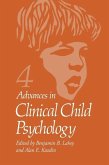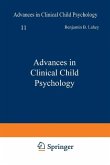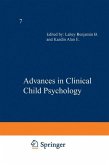This nineteenth volume of Advances in Clinical Child Psychology continues our tradition of examining a broad range of topics and issues that charac terizes the continually evolving field of clinical child psychology. Over the years, the series has served to identify important, exciting, and timely new developments in the field and to provide scholarly and in-depth reviews of current thought and practices. The present volume is no exception. In the opening chapter, Sue Campbell explores developmental path ways associated with serious behavior problems in preschool children. Specifically, she notes that about half of preschool children identified with aggression and problems of impulse control persist in their deviance across development. The other half do not. What accounts for these differ ent developmental outcomes? Campbell invokes developmental and fam ily influences as possible sources of these differential outcomes and, in doing so, describes aspects of her own programmatic research program that has greatly enriched our understanding of this complex topic. In a similar vein, Sara Mattis and Tom Ollendick undertake a develop mental analysis of panic in children and adolescents in Chapter 2. In recent years, separation anxiety and/ or experiences in separation from attach ment figures in childhood have been hypothesized as playing a critical role in the development of panic. This chapter presents relevant findings in the areas of childhood temperament and attachment, in addition to experi ences of separation, that might predispose a child to development of panic.
Dieser Download kann aus rechtlichen Gründen nur mit Rechnungsadresse in A, B, BG, CY, CZ, D, DK, EW, E, FIN, F, GR, HR, H, IRL, I, LT, L, LR, M, NL, PL, P, R, S, SLO, SK ausgeliefert werden.
`The series continues its strong track record of providing a useful resource for individuals interested in theory, research, and practice in clinical child psychology...Each new volume offers an exciting glimpse of potentially important new developments.`
Child and Family Behavior Therapy.
Child and Family Behavior Therapy.
`The series continues its strong track record of providing a useful resource for individuals interested in theory, research, and practice in clinical child psychology...Each new volume offers an exciting glimpse of potentially important new developments.`
Child and Family Behavior Therapy.
Child and Family Behavior Therapy.









